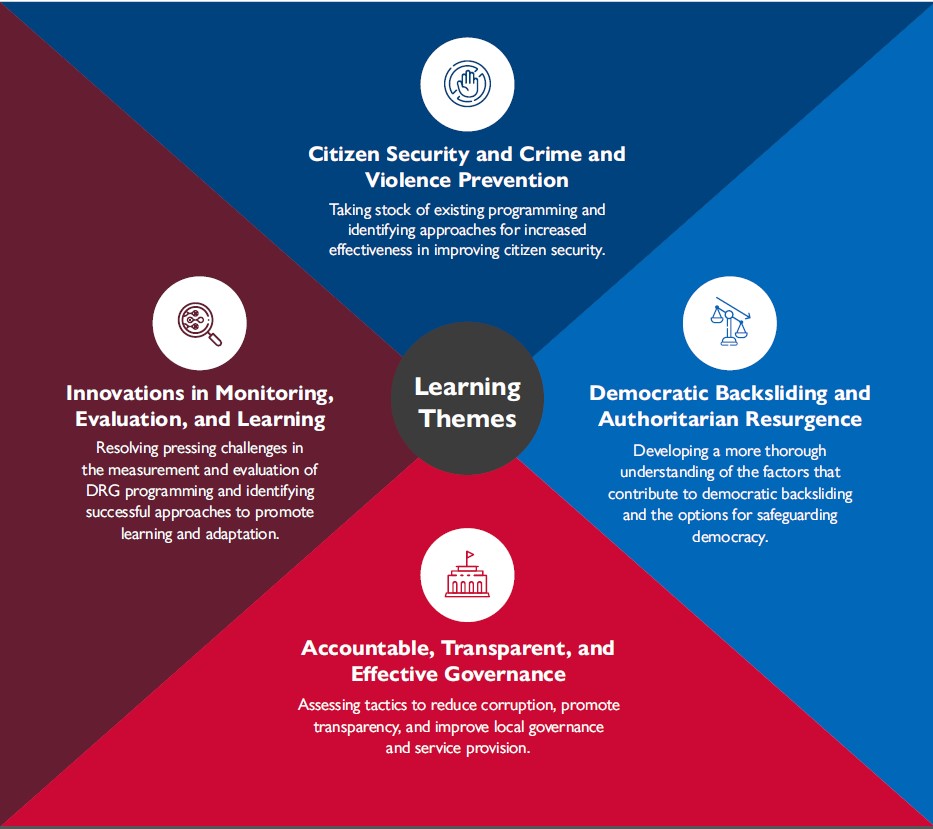
IMPORTANT NOTICE - UPDATED OCTOBER 2024:
ENG - LACLEARN PUBLISHES FY25 Annual Program Statement (APS) for Grants Under Contract (GUCs)
ES - LACLEARN FY25 Annual Program Statement (APS) para Grants Bajo Contrato (GUCs)
FREQUENTLY ASKED QUESTIONS FROM GRANTEE APPLICATIONS
Overview
According to recent reports from Freedom House, the Varieties of Democracy Institute, and the Economist Intelligence Unit, many LAC countries are experiencing declines in democracy-focused Sustainable Development Goals. Throughout the region, countries face escalated crime and violence, weakened democratic institutions, increased corruption, and broader democratic and security crises. If not addressed, these issues will impede efforts to promote inclusive growth, reduce poverty, bolster resilience, and strengthen democracy throughout the region.
Under the Analytical Services IV IDIQ, the LACLEARN Task Order contributes to improving USAID’s DRG and citizen security work in LAC through three key aims:
1. Analytical Services: Generating evidence through gender-informed analytical research, assessments, and studies.
2. Learning Support: Facilitating evidence utilization, dissemination, and related capacity building.
3. Rapid Response: Targeted and short-term technical assistance for transition environments.
LACLEARN has provided services for USAID’s LAC Bureau, technical bureaus based in Washington, and over 10 local Missions/offices in LAC. The mechanism undertakes a demand-based approach to meet stakeholders’ needs and accepts buy-ins from Missions and other operating units for activities. To date, LACLEARN has implemented over 45 research/learning activities and issued over 30 grants to local and regional organizations. LACLEARN is managed by the LAC Bureau’s Office of Regional Sustainable Development (LAC/RSD).
Evidence Overview
Below is an overview of LACLEARN-generated evidence over 2020-2024, with links to available resources. These research and learning products are categorized by LAC/DRG Learning Agenda themes. Please see the following sections of this page for additional information.
Illustrative Activities:
LACLEARN’s LAC/DRG Learning Agenda (2021) prioritizes four learning themes: 1) Citizen Security and Crime/Violence Prevention; 2) Accountable, Transparent, and Effective Governance; 3) Democratic Governance and Authoritarian Resurgence; and 4) Innovations in Monitoring, Evaluation, and Learning (MEL).
Illustrative activities for consideration include:
- Conduct targeted studies and assessments tailored to Mission strategic needs, such as diagnostic research on select DRG trends.
- Develop toolkits for practitioners to promote best practices in LAC/DRG program design, implementation, and evaluation.
- Facilitate regional learning events to highlight technical innovations, share lessons learned, and build communities of practice across LAC.
- Provide targeted and short-term technical assistance to support country-level response preparedness in transition environments, such as rapid research and learning support.
- Mobilize grants for local research and learning initiatives (see Y4 Annual Program Statement).
- Implement an Evidence Help Desk to support urgent evidence needs on select themes.